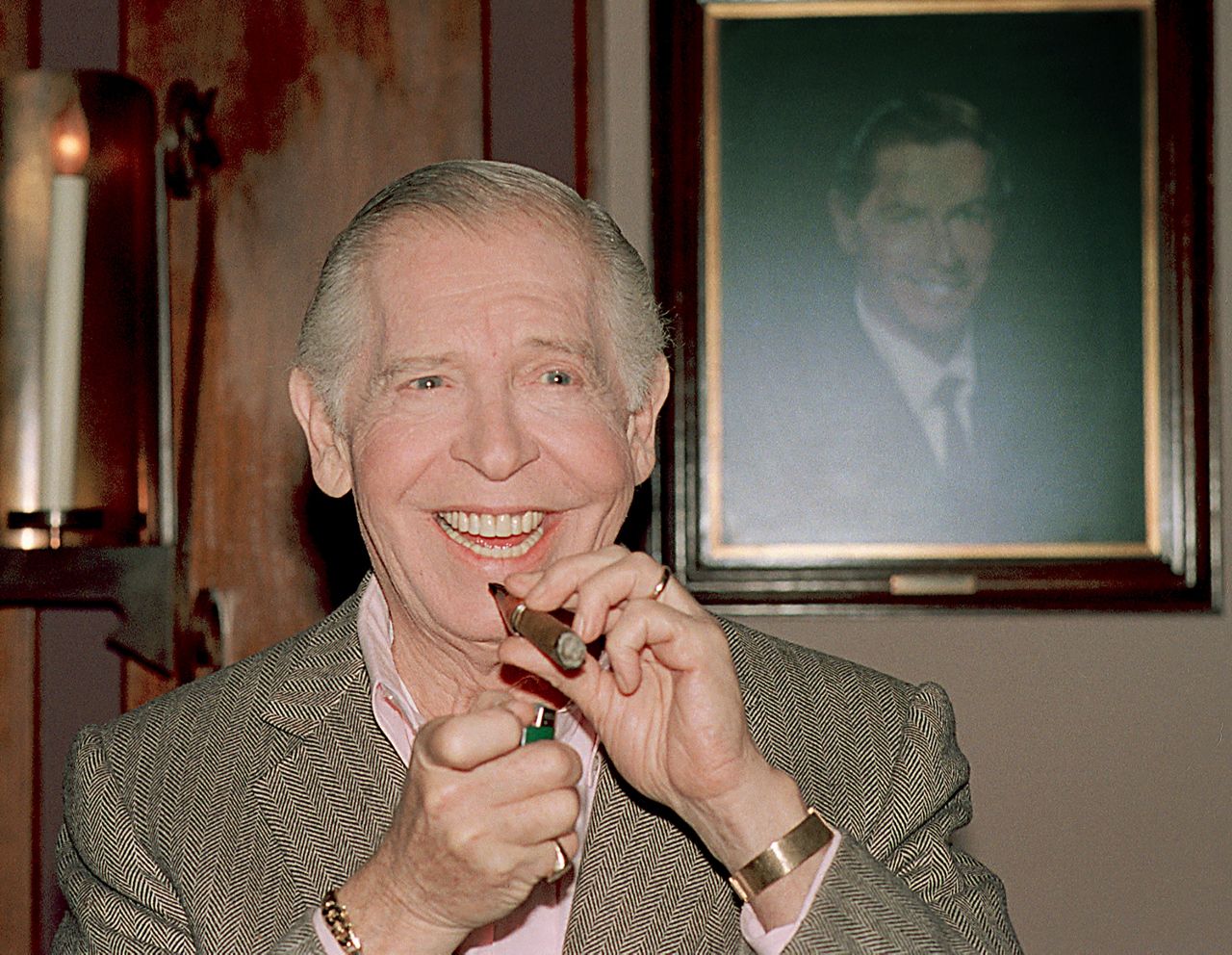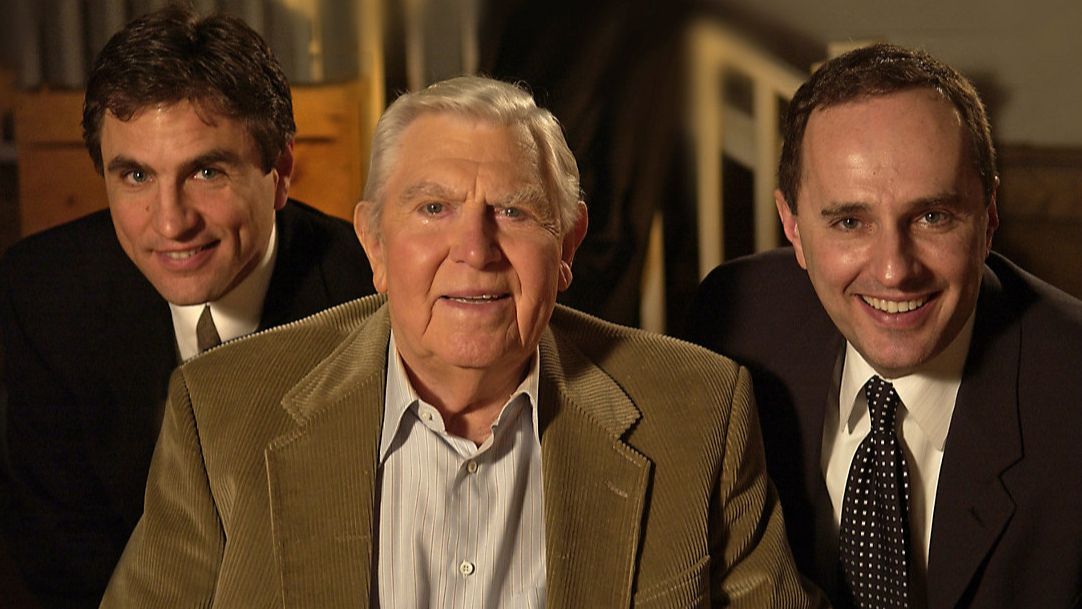(Editor’s note: First of a three-part series on Wisconsin natives Steve Boettcher and Mike Trinklein, an unlikely pair of University of Wisconsin-Oshkosh graduates who chronicled the history of television through the PBS series “Pioneers of Television,” speaking with hundreds of Hollywood’s biggest stars).
So there were these two guys from Wisconsin, who each, for God knows what reason, thought it would be a good idea to leave secure jobs and start a television production company, with the idea that they would go to Hollywood and track down every A-lister they could find and get them to tell their life story.
Wait, what?
What You Need To Know
- "Pioneers of Television," produced by UW-Oshkosh graduates Steve Boettcher and Mike Trinklein, ran for four seasons on PBS and received three Emmy nominations.
- The two also produced "Betty White: A Celebration," which recently was shown in 1,500 theaters across the country on Jan. 17 to celebrate the life of one of America's most beloved actresses, who passed away at age 99.
- Watch for new episodes of "Pioneers of Television" coming to PBS.
- Read part 2 here and 3 here.
“I was a young man in my 30s and every indication in the world is this is the worst idea,’’ said Steve Boettcher, a photographer at WTMJ in Milwaukee whose chief indicators were his stay-at-home wife, who cared for their three children, all under the age of five.
“It was a leap of faith.”
But the Appleton native had a good friend who also had faith, though was not quite the leaper.
Mike Trinklein, of Cedarburg, met his fellow Radio-TV-Film major at the University of Wisconsin-Oshkosh and was so impressed with him from the minute they first met, this whole Hollywood idea seemed… possible.
“Did he tell you the story of how he got his first job?’’ said Trinklein, who taught journalism and media production for nearly 20 years at Idaho State University. “It’s a great lesson for anybody, really. It was channel 11 (in Green Bay), and he basically just called the news director every day. And the guy got so sick of it, he finally hired him.
“The guy wasn’t difficult. He just was relentless in his pursuit of that job. Most of us get a ‘No’ and we quit, but he didn’t. And that’s the summary of his whole career, really, is he just continued to not take ‘No’ for an answer. He gets things done just through sheer persistence.’’
And sure enough, a few years later, Steve Boettcher found himself at the old Friars Club in Beverly Hills, Calif., standing face-to-face with the man he hoped would get behind, approve and support this project, Mr. Television himself, Milton Berle.
****
As producers of the student-run “This Week” television show at UW-Oshkosh, Boettcher and Trinklein figured that learning necessary skills, and having fun at the same time, was a reasonable combination.
They became religious viewers of “The David Letterman Show,” which in 1980 ran at 9 a.m. and produced a kind of edgy comedy Boettcher and Trinklein felt needed replicating at the local level.
“We did fun little videos like, ‘Why is (Titan) stadium across the river and there’s no way to get to it when you’re a student?’’’ said Boettcher. “So we had Bob (Brainerd, the host of ‘This Week’ at the time and now a broadcaster for Rush Media Company in Waunakee) swimming the river one day, trying to get across the river and swim to the stadium and we had him coming up with seaweed and all kinds of stuff.
“We did a segment where we went through the garbage of the chancellor to see what he was eating. One Christmas we had Bob chugging egg nog, and it went down a little too fast and came up even faster — on camera. I’m not sure the university really embraced these ideas that much.’’
Yes, ideas. These guys were the Billy “Blaze” Blazejowski of their time. And it wasn’t all for fun.
They thought they could convince local car dealers to sell their cars on the local cable access channel.
“They thought it was the stupidest idea ever,’’ said Trinklein.

There was the idea of filming the accommodations of Wisconsin resorts, putting it on a VHS tape to make the decision process easier for consumers, and selling it Blockbuster. That didn’t work either.
“We thought, you know, people like homes,’’ said Trinklein. “And we did a pilot for a show called ‘America’s Homes’ where people would, you know, a lovely tour guide would take you through a lovely home and show you a little bit. Well, that’s an entire network now; multiple networks. But that didn’t sell either. We were a little bit ahead of our time. So we always were trying fun things and that’s what really united us. We both kind of had an entrepreneurial zeal.’’
Graduation and, well, life slowed down their collaborations, but not the river of ideas. Despite the distance between them, they kept in contact, kept bouncing ideas off each other, and were determined to press on with their shared passion.
One of Trinklein’s colleagues at Idaho State had become somewhat of Bigfoot expert. So Trinklein talked Boettcher into coming out to the state of Washington and spend a week in the wilderness for a Bigfoot documentary. But that was another idea that never came to fruition.
“But all these things they kind of develop our skills, it helps us to figure things out and, eventually, some of this stuff started to take root,’’ said Trinklein.
They completed a two-year documentary project on the Oregon Trail, where they filmed the entire 2,000 miles, all while Boettcher was at WTMJ and Trinklein, a full-time college professor.
That project led to another on the California Gold Rush. It was funded by Wells Fargo, picked up by PBS and narrated by actor John Lithgow. No longer were they two unknown guys from Wisconsin.
“That was kind of a breakthrough project for us,’’ said Boettcher.
And it was while he was on one of those trips out west when Boettcher picked up the local paper and something struck him.
“Someone passed away, and it was in the newspaper, a huge, half-page article about them passing away,’’ said Boettcher of the movie star. “And then next to that was a man that developed some amazing medical device, and he got maybe an inch in the paper. And I thought, 'There is just something about these entertainers that we embrace; something about them being almost part of the family.’'’
The actors and actresses of the television era in which he grew up — many of whom made the successful transition from vaudeville to radio to the small screen — were an aging society.
“And I just grew up with these kinds of people that I just thought were so important and no one was capturing any of the history of their life,’’ said Boettcher. “So we just started on this mission.’’
****
Boettcher will tell you everything he learned about journalism he learned at UW-Oshkosh. And one of those things was the direct route was often not the best path to land an interview.
He targeted Berle, who founded the Friars Club, a popular hangout for comedians and actors. But he wondered how would he ever get Berle to agree to speak with him? An audience with the Pope seemed just as realistic.

Boettcher decided he would fly to Los Angeles, rent a car, change into a suit and drive over to the Friars Club and introduce himself to the receptionist. He bought her flowers, candy and sprinkled in a few tablespoons of “Wisconsin Nice.” And, eventually, he convinced her to share some of the phone numbers of one of the most valuable Rolodexes in Hollywood.
“And I got a lunch with Milton Berle,’’ said Boettcher. “I remember going to the table at the restaurant, and they sat across the restaurant, so I had to walk all the way across the dance floor to a table at the end. And they just sat and watched, and they’re just staring you down.
“And on one side is the agent, one side is the manager and Milton Berle is in the middle. And they all have these cigars that are like a foot-and-half long, and they’re smoking these cigars, and Milton said, ‘Are you Jewish?’ That’s the first thing he said to me. You don’t know how to answer that. I said, ‘Well, I’m part Jewish.’ He said, ‘What part?’ I said, ‘Well, the part that does business.’ He then said, ‘I like you. Sit down.’ And that was the beginning of it.
“And he opened the door to everybody.’’
From Bob Hope to Robin Williams, Johnny Carson to Mary Tyler Moore, Red Skelton to Betty White — over 200 actors in total — agreed to sit down and tell their stories to Steve Boettcher and Mike Trinklein.
They turned those interviews into the PBS series “Pioneers of Television,’’ which ran from 2008 to 2019 and received three Emmy nominations.
And as you might have guessed, after talking to the Who’s Who of Hollywood, they have stories to tell.
You can reach Mike Woods at 920-246-6321 or at: michael.t.woods1@charter.com



